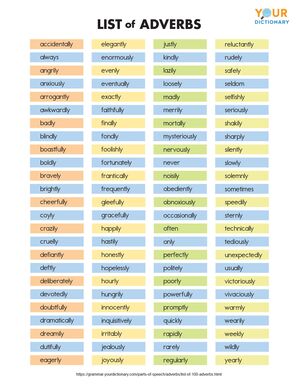

The adverb can be one of the very most absolutely, positively, completely, totally, and truly confused parts of speech in the English language. Adverbs are often confused with adjectives; however, adjectives describe nouns, while adverbs describe verbs. Learn more about adverbs with a thorough list of adverbs for all kinds of descriptions.
Positive Adverbs List
If you need a word that shows how an action was done in a positive way, look no further. These adverbs can turn a boring paragraph into a sunbeam with their sunny outlook.
- boldly
- bravely
- brightly
- cheerfully
- deftly
- devotedly
- eagerly
- elegantly
- faithfully
- fortunately
- gleefully
- gracefully
- happily
- honestly
- innocently
- kindly
- merrily
- obediently
- perfectly
- politely
- powerfully
- safely
- victoriously
- warmly
- vivaciously
These adverbs can make someone's ordinary actions seem more positive. For example, "Sarah asked for the salt" is straightforward, but "Sarah politely asked for the salt" lets us know that Sarah has good table manners.
Negative Adverbs List
If life isn't looking so positive for you or your characters, you might need an adverb that suits a more negative tone. Here's a list of adverbs that have negative connotations.
- achingly
- angrily
- annoyingly
- anxiously
- badly
- boastfully
- dejectedly
- enviously
- foolishly
- hopelessly
- irritably
- jealously
- joylessly
- lazily
- miserably
- morosely
- obnoxiously
- painfully
- poorly
- rudely
- sadly
- selfishly
- terribly
- unhappily
- wearily
Adverbs like these can help you describe negative attitudes when needed. For example, "Sarah irritably asked for the salt" sets a much different scene than the positive example above!
List of Adverbs About Time
Adverbs can also convey how often something happens. They range from very often ( always, frequently, regularly) to not very often (rarely, seldom, never).
- always
- daily
- eventually
- finally
- frequently
- generally
- hourly
- later
- never
- nightly
- normally
- occasionally
- often
- rarely
- regularly
- seldom
- sometimes
- soon
- still
- today
- tomorrow
- usually
- weekly
- yearly
- yesterday
These adverbs can make a big difference in the sentence you're writing. For example, "I'll pay you later" is a solid promise, but "I'll pay you daily" is a much nicer offer.
List of Adverbs That Describe Speed
Describing how fast an item moves is a great way to modify a verb! Use these adverbs when you're talking about the speed of a verb.
- briskly
- casually
- expeditiously
- fleetingly
- gradually
- haltingly
- hastily
- hurriedly
- immediately
- instantly
- languidly
- lazily
- leisurely
- promptly
- quickly
- rapidly
- slowly
- speedily
- swiftly
- tediously
These adverbs can help you establish pacing in your writing. For example, "I leisurely packed my suitcase" makes the story sound more relaxed, but "I hastily packed my suitcase" brings a sense of urgency to the scene.
Adverbs That Describe Sound
Writers often need to describe the noise that something makes to strengthen their writing. Use these adverbs to describe how something sounds in your story.
- audibly
- deafeningly
- ear-splittingly
- emphatically
- faintly
- inaudibly
- loudly
- noiselessly
- noisily
- quietly
- resonantly
- resoundingly
- shrilly
- silently
- softly
- soundlessly
- thunderously
- uproariously
- vociferously
- weakly
These adverbs are effective ways to bring sensory language into your writing. For example, "He snored faintly" paints a much different picture than "He snored thunderously."
Adverbs That Describe Tone
Some adverbs need context to create tone. Use these adverbs when you need to paint a very clear picture of how the reader should imagine your verbs. Some adverbs include:
- accidentally
- awkwardly
- blindly
- coyly
- crazily
- cruelly
- defiantly
- deliberately
- doubtfully
- dramatically
- dutifully
- enormously
- excitedly
- hungrily
- madly
- mortally
- mysteriously
- nervously
- seriously
- shakily
- restlessly
- solemnly
- sternly
- unexpectedly
- wildly
Choosing the right adverbs can help you establish your desired tone. For example, "Mike shook my hand solemnly" sets a scene, but "Mike shook my hand excitedly" reveals that something fun might be about to happen.
Printable List of Adverbs
If you'd like a handy list of adverbs for easy reference, take a look at the PDF below. You can download and print it up for prominent posting in your writing station, classroom or notebook.

Many Kinds of Adverbs
Many adverbs can be formed simply by adding -ly to the end of what was once an adjective. Anxious becomes anxiously, for example, and poor becomes poorly. But adverbs that describe how often something occurs, such as never or always, don't always follow that rule.
The main types of adverbs answer questions related to time, place, manner, frequency, and extent. Depending on what you want to modify, adverbs are the perfect way to make your writing more vivid and descriptive.
More Useful Word Lists
Now that you have a better handle on the world of adverbs, why not expand your vocabulary with even more word lists too? This list of descriptive adjectives is a great place to start, including simple adjectives, compound adjectives and proper adjectives. Then you can tie your writing together, with a list of transition words.